The Enduring Legacy of Randy Edelman’s “Gettysburg” Theme in Film, Television, and Cultural Events
“Even if he had only written the theme for Gettysburg, Randy Edelman would have earned a permanent place in the pantheon of film and television scores”…. From a post in BMI’s newsletter
I was recently prompted to watch a YouTube video of Stephen Curry’s record breaking three-point shoot during an NBA game. Curry has defined the art of three-point shooting and in December 2021 he broke Ray Allen’s all time 3-point record. Then loudly and unmistakably the theme from Gettysburg was played in the background while Curry celebrated his triumph.
Randy Edelman’s score for the 1993 film Gettysburg stands as a powerful musical embodiment of the American Civil War’s most pivotal battle. Edelman’s composition has transcended its original context, finding resonance in various media and public events. The purely superb dramatization of the crucial climax of the Civil War was a clash so enormous that whoever won The Battle of Gettysburg became destined to win the war. Brilliantly produced by Ted Turner and magnificently directed and screen-written by Ron F. Maxwell, the motion picture enjoyed moving raves.
The multifaceted presence of the Gettysburg theme across different platforms has had a lasting impact on American cultural memory. Commissioned for Ronald F. Maxwell’s epic film adaptation of Michael Shaara’s novel The Killer Angels, Edelman’s score was crafted under tight time constraints. Instead of delving into period-specific music, Edelman focused on creating thematic motifs for each prominent character, allowing the film’s narrative and emotional arcs to guide his compositions. The result was a score that seamlessly wove together the personal and collective experiences of the characters, enhancing the film’s storytelling.

The film follows front lines as well as strategic maneuvers behind the scenes. Armed by the strength of human flesh and the will of man there was a whirlwind of disorder and violence and a blur of scarlet color and vicious motion as the war raged on. Deafening blood pounded in the ears drumming to a ferocious beat. The sound was barely enough to obscure the cries of men and the screams of injured beasts…..
The Gettysburg theme has become a staple in American patriotic events, notably featured in July 4th celebrations across the country. Its stirring melodies evoke a sense of national pride and reflection, making it a fitting accompaniment to commemorations of American history.
Edelman’s Gettysburg music is again written forever in this side of history in the NASA documentary “Dare Mighty Things” which is said to be a quote from Teddy Roosevelt’s “Strenuous Life” speech. “Far better is it to dare mighty things, to win glorious triumphs, even though checkered by failure…than to rank with those poor spirits who neither enjoy nor suffer much, because they live in a gray twilight.”
In both films Edelman’s larger than life score encourages feelings of honor for the country’s forefathers and the nation’s unity. His music communicates, moves and expresses emotions and ideas while mobilizing solidarity. Since the founding of the US, its citizens have shared victories and tragedies, endured economic depressions, global war, and continue to grapple with issues of race, class, and sex. They don’t always agree but their patriotism keeps them moving forward. The US constitution became the blueprint by which the nation was established and crafted for its vision of the future. Edelman’s score is the blueprint of the music that ties this all together and fosters that vision and belief timelessly.
Edelman’s composition found a place in sports media, with NBC utilizing the closing music of Gettysburg during the end of the 1996 Summer Olympics. This choice underscored the theme’s versatility and its ability to convey triumph and solemnity in various contexts.
Beyond its original use, elements of the Gettysburg score have been repurposed in film trailers and television programs. Edelman’s work, including pieces from Gettysburg, have been featured in trailers for other films and in Disney productions, demonstrating the score’s broad appeal and adaptability.

Critics and audiences have lauded the Gettysburg score for its emotional depth and narrative cohesion. The music’s ability to stand alone, independent of the film, speaks to its compositional strength. Tracks like “Main Title,” “Reunion and Finale,” and “Over the Fence” have been highlighted for their poignant representation of the film’s themes of heroism and sacrifice.
The enduring presence of his Gettysburg theme in various cultural arenas attests to its significant impact and the composer’s skill in capturing the essence of a historical moment through music. Randy Edelman’s Gettysburg theme transcends its original cinematic purpose, embedding itself in the fabric of American cultural expression. Its adoption in national celebrations, sports events, and other media underscores its versatility and emotional resonance. As a musical narrative, it continues to evoke the complexities of the Civil War era, serving as a testament to the power of film scores in shaping and reflecting collective memory.
See composer Randy Edelman live at Lincoln Center on June 6, 2025 where he will perform the theme from Gettysburg during his solo performance. See ticket link below:
https://ticketing.jazz.org/18349
Stephen Curry Video on Youtube:
https://youtu.be/IpSLadH6sNA








